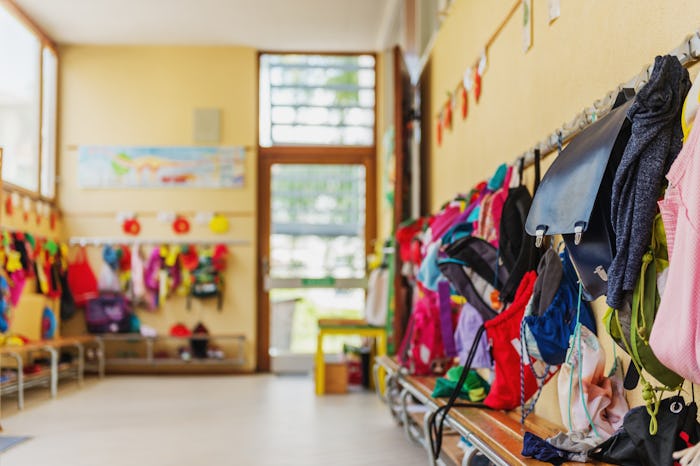Life
These Babies Reportedly Got Measles At A Daycare — Here's Why That's So Scary
The last few years have not been good for measles prevention. A number of states, including Minnesota and California, found themselves grappling with measles outbreaks that were driven, in part, by the rise in unvaccinated children. And, as more and more kids are left vulnerable, the highly contagious illness continues to spread. In fact, three babies contracted measles at a daycare in Johnson City, Kansas, this month, highlighting why vaccinations are an important tool in disease prevention.
The Johnson County Health Department released a statement on Tuesday revealing that three infants became infected with measles after they attended the same daycare center, according to the International Business Times. These three incidents are the first reported measles cases in the state this year, IBT reported.
The babies, who are all under one year old, were particularly susceptible to contracting the disease because the MMR (measles, mumps, rubella) vaccine is typically not given to infants before 12 months, according to the U.S. Centers for Disease Control and Prevention. Nancy Tausz, health service division director of the Johnson County Health Department, told IBT, "Measles is still out there, and people get kind of complacent with vaccines, but you certainly don't want to get measles."
Since measles is highly contagious and easily spread, the babies and others who came in contact with the infants have been removed from the daycare, IBT reported. The Johnson County Health Department said in a statement Tuesday, according to the International Business Times,
In order to prevent the spread of measles, the affected children and others they have come in contact with have been excluded from the child care facility for 21 days following the last exposure to the disease, as per the Kansas Administrative Regulation 28-1-6. Any child that has been exposed to measles should not attend any childcare facility or school. This protects the community from further spread.
Measles is spread through coughing and sneezing, and can live up to two hours in the air where an infected person sneezed and coughed, according to the CDC. An adult or child who isn't immune to measles can contract disease if they come into contact with an infected surface, then touch their noses, eyes, or mouths.
From Jan. 1 to Feb. 24, there have been 13 reported cases of measles infection in seven states: Arkansas, Illinois, Indiana, New York, Oklahoma, Pennsylvania, and Texas, according to the CDC. Last year, there were a total 118 measles cases in 15 states and the District of Columbia, CDC data showed. The federal health agency stated that these cases occurred primarily in adults and children who were unvaccinated.
The reports from Kansas, and measles outbreaks over the last year, illustrate why it's important that children receive immunizations. But parents should also do their due diligence, and keep up with their vaccinations. The CDC recommends that every adult keep on top of their childhood vaccinations because not all immunizations are lifelong, making booster shots for Tdap and other vaccines necessary, especially in pregnant people.
When an adult is vaccinated, not only are they guarding themselves against measles and other disease, they are also protecting the little ones in their care. Although the CDC recommends that kids get vaccinated from birth until age 18, they will not be immunized against every illness at one time — or at all. Infants, for example, are particularly susceptible to the flu before 6 months old because there is no flu vaccine available for newborns, according to WebMD. So when a parent or caregiver is up-to-date on their vaccinations, they are safeguarding themselves against diseases that could easily infect a child at the time.
As the Kansas case shows, people should not take vaccinations lightly. Babies are susceptible to highly contagious diseases that can turn life-threatening. Although there may be other ways to prevent the spread of certain diseases, research has shown time and again that vaccines are the safest and most effective option. Let's use those tools.
Check out Romper's new video series, Bearing The Motherload, where disagreeing parents from different sides of an issue sit down with a mediator and talk about how to support (and not judge) each other’s parenting perspectives. New episodes air Mondays on Facebook.
